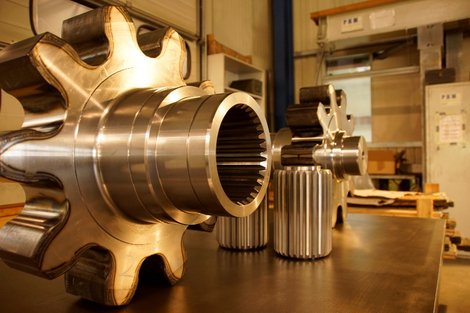Pilot project: a miniature solar power plant for developing- and threshold countries

With a nationwide network of companies, PHM Industrieanlagen GmbH (PHM Industry Systems) from Saxony-Anhalt is strengthening the manufacturing of innovative high-quality products.
Competition between companies is important – it keeps national economies on course for growth. Equally important is developing and maintaining business relationships with suppliers and customers. This has been demonstrated by the successful company history of PHM Industrieanlagen GmbH in Saxony-Anhalt. The company is based in an industry park in Burg near the city of Magdeburg.
"The company name, PHM, stands for the design, manufacturing and assembly of sophisticated precision components and assemblies," explains the Managing Director of PHM, Tino Lerche. Together with his sister, he assumed management of the company, taking the place of his father Joachim, two years ago. A mechanical engineer, Joachim had founded the family business in 1992. In 2016, after successfully completing their education in engineering, as authorised signatories, his children became responsible for the management.
"Our trademark is providing a product from one single source," says Tino Lerche. The medium-sized company is committed to making modern innovative ideas usable in a variety of ways, and across all sectors – from plant engineering and mechanical engineering through to the rolling mill and metallurgical industry, to energy and environmental technology and to railway vehicle manufacturing. As a systems supplier, PHM has supplied high-quality components and assemblies to Carl Zeiss Jena, the Deutsche Bahn, the SMS Group and TAKRAF GmbH.
"Transferring technological innovations to other industries is our pet project" explains the Managing Director of PHM. Taking an example, he refers to electron beam processes, which can be used for the drilling, hardening and welding of a variety of materials. This, for example, led to a project with the Deutsche Bahn AG: PHM succeeded in replacing the faulty hollow shaft housings on the electric locomotives that were originally used in the former East Germany by the GDR state railways (the Reichsbahn) with low cost housings that are much more durable. This has been made possible by replacing old casting and smelting production technologies with the use of more up-to-date electron beam and rolling welding processes. "This constitutes a huge step forwards in the production of hollow shaft housings, as it means a hundredfold increase in product lifespans, and also reduces their manufacturing costs by fifty percent," highlights Managing Director Lerche.
For the world: a miniature solar power plant from Burg
One of the most recent technical innovations from PHM Industrieanlangen GmbH is a miniature solar power plant. "This was originally my father’s idea, one which he had after travelling abroad several times," explains Tino Lerche. It has culminated in a pilot project in which sunlight is used in order to heat water and convert it into steam. Electrical power is then generated with the steam. It is an environmentally friendly and resource-saving alternative to diesel generators, which often remain necessary for being able to run technical facilities in places in which the sufficient infrastructure is lacking. Among others, as practical examples of its application, Tino Lerche refers to the supply of electrical power to signalling and points systems in developing and threshold countries such as India. "We have developed a test facility and want to start the initial testing of the micro solar power plant in a few weeks’ time. Several years could yet pass until the commercial maturity of the product, however. The legally-specified approval requirements require proof of a service life capability of more than 8,600 hours. This know-how will give PHM the opportunity to gain a foothold in developing and threshold countries with strong levels of sunlight.
Provider of systems uses a wide-ranging network of companies
PHM sees itself as being a provider of systems with sophisticated services which range from order planning to the delivery of a quality-tested product. In this respect, the company draws on its contacts with some 1,400 companies in the field of plant engineering and mechanical engineering. "Many of these small and medium-sized companies have specialised in core competencies such as electron beam welding," explains Tino Lerche. "Our task is to interface these services in the interests of major customers," adds the Managing Director of PHM. The objective is to offer the end customer high-quality, innovative products at optimum prices.
In this context, the company from Saxony-Anhalt makes use of its manufacturing network, which has particular expertise in the area of mechanical- and plant engineering. Around 96 percent of these companies manufacture in Germany, with a smaller proportion located in neighbouring European countries such as France, Switzerland and the Netherlands. The firm also collaborates closely with mechanical- and plant engineers in the area surrounding Burg, Magdeburg, and Staßfurt. PHM is also a member of the Saxony-Anhalt SMAB (specialist mechanical and plant engineering) cluster, and cooperates with the universities and colleges in the federal state of Saxony-Anhalt.
Investments in cutting-edge, non-destructive measuring and testing techniques
"The transfer of knowledge and technology across various sectors plays a key role in our company," says Tino Lerche. The company PHM Industrieanlagenbau GmbH ultimately stands for the provision of a high quality product. "That’s why we invested heavily in modern, non-destructive measurement and testing techniques last year. It is in this way that the company from Saxony-Anhalt fulfils its customers' wish for quality products that are "Made in Germany".
In terms of the Industry 4.0, the company from Saxony-Anhalt has also digitised many of its business processes – with the support of a regional service provider from Magdeburg, which has connected the industry park in Burg to the worldwide web. "All of our business processes have since been digitised," highlights Tino Lerche. Currently, the data width is still sufficient. In the long term, the company is hoping for a further expansion so that it is able to transfer large amounts of data from three-dimensional objects.
Author: Uwe Seidenfaden
